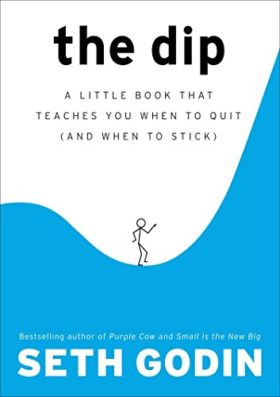
The Dip
Author: Seth Godin
Release: May 10, 2007
Tagline: A Little Book That Teaches You When to Quit (and When to Stick)
Publisher: Portfolio
Genre: Time Management, Decision Making, Self-Help, Management, Resources
ISBN-10: 1591841666
ISBN-13: 978-1591841661
Main Character: You
Synopsis: Every new project (or job, or hobby, or company) starts out fun…then gets really hard, and not much fun at all. You might be in a Dip—a temporary setback that will get better if you keep pushing. But maybe it’s really a Cul-de-Sac—a total dead end. What really sets superstars apart is the ability to tell the two apart.
Declassified by Agent Palmer: The Dip is a Short and Important Book About Quitting by Seth Godin
Features on The Palmer Files Podcast: The Dip with Bill Sweeney.
Quotes and Lines
Most of the time, we deal with the obstacles by persevering. Sometimes we get discouraged and turn to inspirational writing, like stuff from Vince Lombardi: “Quitters never win and winners never quit.” Bad advice. Winners quit all the time. They just quit the right stuff at the right time.
This is a very short book about a very important topic: quitting.
You really can’t try to do everything, especially if you intend to be the best in the world.
Scarcity makes being at the top worth something.
Best is subjective. I (the consumer) get to decide, not you. World is selfish. It’s my definition, not yours. It’s the world I define, based on my convenience or my preferences. Be the best in my world and you have me, at a premium, right now.
It’s easy to be a CEO. What’s hard is getting there.
The Dip creates scarcity; scarcity creates value.
Hardworking, motivated people find diversification a natural outlet for their energy and drive. Diversification feels like the right thing to do. Enter a new market, apply for a job in a new area, start a new sport. Who knows? This might just be the one.
And yet the real success goes to those who obsess. The focus that leads you through the Dip to the other side is rewarded by the marketplace in search of the best in the world.
Eight Dip Curves
Manufacturing Dip
Sales Dip
Education Dip
Risk Dip
Relationship Dip
Conceptual Dip
Ego Dip
Distribution Dip
As the Declaration of Independence warns us, “all experience hath shewn that mankind are more disposed to suffer, while evils are sufferable, than to right themselves by abolishing the forms to which they are accustomed.”
The Opposite of Quitting Isn’t “Waiting Around”
No, the opposite of quitting is rededication.
Short-term pain has more impact on most people than long-term benefits do, which is why it’s so important for you to amplify the long-term benefits of not quitting.
Persistent people are able to visualize the idea of light at the end of the tunnel when others can’t see it. At the same time, the smartest people are realistic about not imagining light when there isn’t any.
Quitting the projects that don’t go anywhere is essential if you want to stick out the right ones. You don’t have the time or the passion or the resources to be the best in the world at both.
It’s easy to wring your hands about becoming a failure. Quitting smart, though, is a great way to avoid failing.
Quitting is better than coping because quitting frees you up to excel at something else.
“Never quit something with great long-term potential just because you can’t deal with the stress of the moment.” Now that’s good advice.
Quitting is not the same as panicking. Panic is never premeditated. Panic attacks us, it grabs us, it is in the moment.
If you’re trying to succeed in a job or relationship or at a task, you’re either moving forward, falling behind, or standing still. There are only three choices.
If it scares you, it might be a good thing to try.
This book is really short. Short books are hard to write, but you made me do it. My readers are excellent correspondents, and this is something I’ve learned from them along the way: Write less.